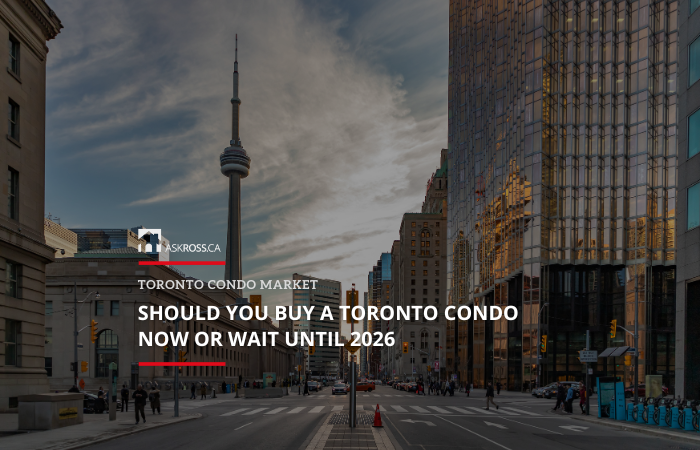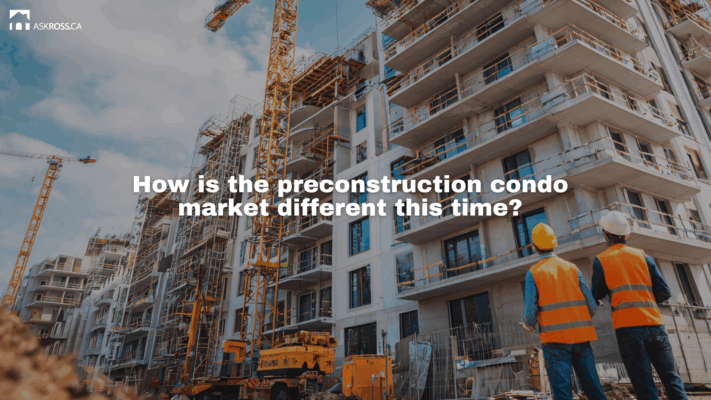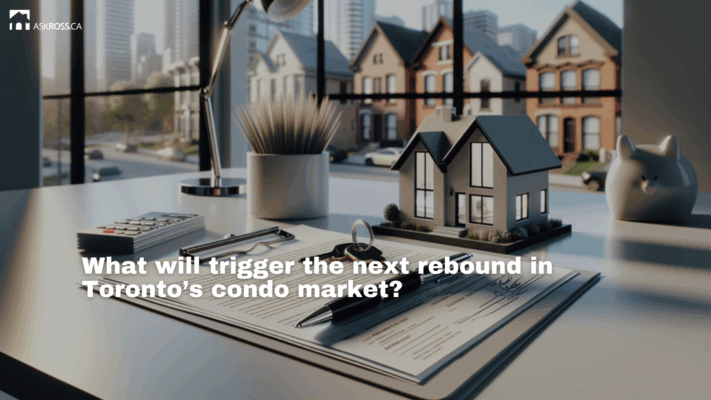
Published: October 10th, 2025 • Last Updated: January 7th, 2026
Author: Ross Taylor on AskRoss.ca
Toronto Condo Market in 2025: What Buyers and Renters Need to Know Before 2026
Toronto’s condo market is in rough shape. No sugar-coating it.
Prices continue to fall and buyers are rubbing their hands in glee – or are they?
Headlines are flying around with terms like implosion and free fall, and if you’re a buyer on the sidelines, it’s getting harder to tell whether to wait it out or step in.
I’ve seen my fair share of booms and busts in real estate, but what we’re witnessing in Toronto’s condo sector right now is unlike anything we’ve seen since the early nineties.
And yet, if you’re wondering whether this is a massive red flag or a once-in-a-decade buying opportunity, you’re asking the right question.
Let’s unpack what’s happening and what it means for current renters, buyers, and even worried condo owners.
Jump to a specific section in this article ↓↓
- Why is Toronto’s condo market crashing?
- Why aren’t first-time buyers jumping in?
- Is now a good time to buy a condo in Toronto?
- How is the preconstruction condo market different this time?
- What will trigger the next rebound in Toronto’s condo market?
- What type of condo is safer to buy right now?
- The best deals are made when everyone else is too scared to act
- Advice from Ross Taylor Mortgages
- Frequently asked questions about buying a condo in Toronto

Why is Toronto’s condo market crashing?
There are a few brutal truths we need to face. The condo market in Toronto is being hammered from all sides, and the data is ugly.
What the numbers say
- Condo prices are down nearly 19% from their 2022 peak
- Price per square foot has plunged to $823, down 22.5% (stat from condos.ca for the last two weeks)
- Condo sales are a staggering 90% below the 10-year average
- Listings are piling up, and many properties are sitting weeks without a single showing
- Forced sales (i.e. “Power of Sale”) are increasing due to owners defaulting on their loans
- Private lenders are pulling back, and most B-lenders will not advance funds above 75% of appraised value
- Some desperate owners can’t even refinance
- And it’s not just a real estate issue. Immigration numbers have stayed flat since 2024.
↑↑ Back to the list at the top ↑↑

Why aren’t first-time buyers jumping in?
With prices and rates down, this should be theperfect environment for first-time buyers. Yet a recent Royal LePage survey found that 82% of Canadians planning to buy are waiting 12 to 24 months, rather than acting now.
Affordability is still a challenge
- Even though prices are off their highs, the stress test and today’s borrowing costs still push monthly payments out of reach in Toronto and Vancouver for many younger households.
Everyone expects more declines
- Buyers feel no urgency because every signal points to more supply, weaker prices, and lower interest rates in the months ahead. If the same unit might cost less next spring, why move now?
Uncertainty is weighing on confidence
- Trade tensions, economic uncertainty, and shaky consumer confidence are enough to make buyers hesitate.
- Many Canadians are taking the time to build bigger down payments instead of rushing into a market that still feels unsettled.
↑↑ Back to the list at the top ↑↑

Is now a good time to buy a condo in Toronto?
This is where it gets interesting. Yes, prices are falling. Yes, the market feels toxic. But for the right buyer, this could be one of those rare windows of opportunity.
Mortgage affordability is better than it looks
- Right now, mortgage payments make up about 24.3% of the average dual-income household’s earnings, down from 31.4% at the market peak. That’s a meaningful drop.
- Combine that with insured 30-year amortizations, and monthly payments for first-time buyers are far more manageable than they were in 2022.
You can rent for less… for now
- Rents are trending lower, and with thousands of new condo completions on the horizon, there’s more supply coming.
- That makes renting attractive in the short term. But it won’t last forever. Once new builds taper off and rental inventory tightens, prices will swing the other way.
↑↑ Back to the list at the top ↑↑

How is the preconstruction condo market different this time?
Toronto’s preconstruction condo market is weak, but it’s not a repeat of the 1990s crash. Back then, developers often built towers without enough buyers, leaving them with unsold units and dragging the market down even further.
Today, stricter lending rules mean most projects must presell at least 70 percent of units before construction starts, which creates a more resilient foundation.
Preconstruction sales are lower than ever
Even though preconstruction sales have fallen to a 33-year low and some buyers are defaulting on contracts, the Canada Mortgage and Housing Corporation points out that Canada’s structural housing shortage will eventually absorb today’s inventory.
Resale condo prices are down about 28 percent since the 2022 peak, but that’s still far less severe than the 43 percent collapse in the early 1990s.
While today’s cooling market is difficult for those who purchased properties at peak prices, the Canada Mortgage and Housing Corporation (CMHC) points out that the slowdown is being driven by higher borrowing costs, rather than by developers oversupplying the market.
In other words, it’s higher interest rates— When borrowing gets more expensive, buyers qualify for less, and prices adjust. This is a policy-driven correction, not a market collapse.
↑↑ Back to the list at the top ↑↑

What will trigger the next rebound in Toronto’s condo market?
No one has a crystal ball, but if you’re trying to time the market bottom (and I’ll tell you why that’s usually a fool’s game in a minute), there are a few key signs to watch for.
Signs the market may be bottoming out
- Interest rates starting with a 3. Condos are extremely rate-sensitive.
- Sales volume is ticking up. A rebound starts when listings actually begin to move again.
- Price per square foot is rising. Look for a few months of consecutive increases.
- Rents are stabilizing. If lease rates stop falling, demand is firming up.
- Sale-to-list ratios are improving. When final sale prices creep closer to asking, the worst may be over.
Here’s the kicker: markets tend to turn before the data makes it obvious. By the time you read the headline saying “Condo Market Rebounds,” prices will already be higher.
↑↑ Back to the list at the top ↑↑

What type of condo is safer to buy right now?
If you’re set on buying before 2026, maybe you’re sick of renting or simply want to take advantage of current low prices; some units will hold value better than others.
Safer bets in today’s market
- One-bedroom-plus-den or two-bedroom units over 700 square feet.
- Buildings with reasonable maintenance fees and strong reserve funds.
- Well-located units near transit or employment hubs.
- Power-of-Sale listings, where distressed sellers sometimes mean spectacular deals.
Smaller studios and micro-condos are riskier right now. They were already a tough sell, and in a falling market, their resale value takes a harder hit.
↑↑ Back to the list at the top ↑↑

The best deals are made when everyone else is too scared to act
Toronto’s condo market is facing a serious correction, and yes, it could get worse before it gets better. But that’s not necessarily bad news.
If you’re a first-time buyer, you might finally be looking at an entry point that makes sense. If you’re an investor, there are serious risks, but also serious upside in the medium term.
And if you already own a condo, I get that it’s unsettling to see values fall, but this isn’t forever. The market runs in cycles.
Remember, the people who bought in 2009 or 2018 during uncertain times didn’t feel great when they signed the paperwork, but they looked like geniuses just a few years later.
I’m not telling you to rush in. But I am saying: pay attention. Do your homework. Know your numbers. And keep your emotions in check. The best deals are made when everyone else is too scared to act.
If you’re on the fence or just want to run your numbers to see what a realistic purchase might look like for you, reach out. I’m happy to help you weigh your options, with no pressure to make a purchase.
Let’s make smart moves, not emotional ones.
↑↑ Back to the list at the top ↑↑

Advice from Ross Taylor Mortgages
- Don’t try to time the bottom perfectly. Even seasoned investors get it wrong. If the numbers work for you and your lifestyle, that’s more important than hitting the exact low.
- Watch for further Bank of Canada rate cuts. Lower rates will improve affordability, but they’ll also pull more buyers back into the market.
- Get pre-approved before shopping. Lenders are tightening criteria, especially for condos. Know your borrowing power before you fall in love with a listing.
- Avoid pre-construction unless you have a strong risk tolerance. In today’s climate, resale is a safer bet.
- Think long term. If you plan to stay in the unit for 5–10 years, the day-to-day price fluctuations matter a lot less.
Buying a condo in a falling market isn’t for everyone, but for the right buyer, this could be a golden opportunity hiding in plain sight.
As always, my team and I are here to help. Reach out to us if you have questions.
↑↑ Back to the list at the top ↑↑

Frequently asked questions about buying a condo in Toronto
Is now a good time to buy a condo in Toronto?
- It depends on your situation. Prices are down almost 20 percent from the 2022 peak, which creates an entry point for first-time buyers who can qualify comfortably.
- On the other hand, the market may remain soft until 2026. If you need stability and do not want to take on short-term price risk, waiting could be a sensible approach.
Will Toronto condo prices drop further?
- Analysts believe weakness may continue for another year or two. Some expect prices to stay soft right through 2027.
- The biggest factors that could drive prices lower are higher interest rates, more forced sales, and continued oversupply from new condo completions.
What signs show that the condo market is starting to recover?
- Watch for sales volumes to pick up, price per square foot to climb for several months in a row, and rents to stabilize. If condos start selling closer to their listing prices, that is another sign the market is moving back toward balance.
Should I rent or buy a condo in Toronto at this time?
- With rents trending downward and thousands of new completions entering the market, renting may be the more affordable short-term option.
- Buying makes more sense if you plan to stay put for at least five years, and the monthly payment works for your budget even under a stress test.
Which condo types are safer to buy in this market?
- Larger one-bedroom-plus-den or two-bedroom units, which are typically over 700 square feet, usually hold their value better than small studios.
- Units in well-managed buildings with healthy reserve funds and reasonable fees are safer bets for buyers focused on long-term ownership.
Are pre-construction condos a good idea in 2025?
- Pre-construction carries more risk today because of uncertain pricing, potential appraisal gaps, and financing challenges at closing.
- Resale condos are typically a safer choice right now since you can secure financing immediately and see the unit before you buy.
How much do I need for a down payment on a Toronto condo?
- For condos priced under $500,000, the minimum down payment is 5 percent. For the portion between $500,000 and $1,499,999, you need 10 percent. Once the purchase price hits $1.5 million or more, a minimum 20 percent down payment is required.
When will Toronto’s condo market likely recover?
- Most analysts expect stabilization in late 2026 as rates ease and population growth resumes, though recovery could vary by neighbourhood.
How do interest rate cuts affect condo affordability?
- Lower rates improve affordability and increase buyer activity, often causing prices to rise again after a lag of several months.
Are condo prices expected to rebound faster than detached homes?
- Typically, detached homes recover first, but condos follow once affordability attracts entry-level and investor buyers back into the market.
What factors could delay Toronto’s housing recovery?
- Persistent high interest rates, a weak economy, and continued oversupply of new condos could prolong the downturn into 2027.
Should investors consider buying Toronto condos in 2025?
- Investors with long-term horizons may find value now, especially in well-located resale properties, but short-term gains remain unlikely until the market stabilizes.

Ross Taylor Mortgages
If you want great service from someone you can trust – reach out to us today.
Get quick answers to your questions, no matter how difficult – 7 days a week.

 Apply For a Mortgage
Apply For a Mortgage